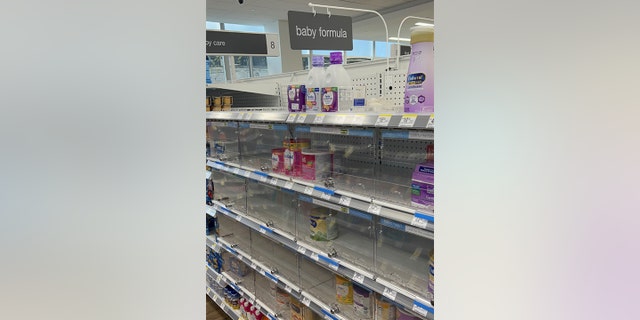Baby formula shortage: why many mothers can’t breastfeed

health Eshrag:
NEWYou can now listen to Fox News articles!
With the recent nationwide baby formula shortage, breastfeeding is often suggested for mothers as a natural alternative, but it’s not so simple, according to a recent the New York Times report.
“TRY BREASTFEEDING. It’s free and available on demand,” singer and actress Bette Midler, 76, tweeted on Thursday, May 12 in response to the national formula shortage.
“Most mothers have the ability to breastfeed, so I feel it’s hard for them to understand what it’s like for a mother who cannot. As a new mom, we’re told it’s so important to breastfeed, even before the baby is born, they drill it into you. After working with five lactation consultants, I wasn’t built for it,” first-time mother Misty Mortezaie, 40, told Fox News.
The New York native, who now has started a family in California, didn’t have a choice – she could only use baby formula to feed her daughter, now a little older than 1.
Midler later qualified her comments on Twitter: “No shame if you can’t breastfeed, but if you can & are somehow convinced that your own milk isn’t as good as a ‘scientifically researched product,’ that’s something else again.”
BABY FORMULA SHORTAGE IS A PUBLIC HEALTH CRISIS
But approximately two out of three infants are not exclusively breastfed for 6 months – and the rate has not improved in over two decades, according to the World Health Organization (WHO).
The American Academy of Pediatrics recommends exclusive breastfeeding for about 6 months, followed by continued breastfeeding as complementary foods are introduced, with the goal of breastfeeding for at least one year, per a release.
“Although most infants receive some breast milk, most are not exclusively breastfeeding or continuing to breastfeed as long as recommended,” according to the Centers for Disease Control and Prevention (CDC).
In the 2019-20 CDC National Immunization Survey, 56.7% of infants surveyed were breastfed at 6 months with the number dropping to 35% at one year, but only 25.8% infants were exclusively breastfed through 6 months.
The agency noted many factors influence how long a nursing mother will breastfeed, including problems with lactation and latching, worries about infant nutrition and weight, medication interactions, unfriendly work policies or parental leave, lack of family support as well as cultural norms.
Grocery store shelves where baby formula is typically stocked are locked and nearly empty in Washington, DC, on May 11, 2022.
(Photo by STEFANI REYNOLDS/AFP via Getty Images)
But the nationwide formula shortage is pushing more mothers to breastfeed, with some trying to find ways to start after they already stopped, but the breasts need constant feedback from the baby to produce milk, per the Times.
After a baby latches on to drink milk, this initiates the “let-down” reflex where the breast nerves are stimulated, triggering the hormone prolactin to stimulate milk production and another hormone known as oxytocin to release, or “let down,” the milk, according to Healthline.
But the body’s feedback loops for breastfeeding “is not especially resilient, in that once it’s over it’s very hard to build it back,” said Dr. Casey Rosen-Carole, director of the breastfeeding and lactation medicine program at the University of Rochester Medical Center.
KENTUCKY MOM OF 9-MONTH-OLD TWINS GOES THROUGH MULTIPLE BABY FORMULA CANS WEEKLY, AIMS TO HELP OTHERS, TOO
This can increase stress for mothers who are trying to breastfeed after stopping by pushing their bodies to almost defy physiology, Rosen-Carole added.
Even though breastfeeding is recommended as the healthiest option for babies, mothers are often ridiculed for the practice in public, while other mothers fear being judged for not following what is often considered the maternal ideal, according to the Times.
“I felt incredibly guilty and tried to hide it. You’re already so emotional due to the change in hormones, then add on not being able to provide something that’s supposed to be so natural and happen automatically, you feel like you’ve already failed as a mom,” Mortezaie added.
But in spite of more lactation rooms in some offices, airports and now hundreds of “baby-friendly” hospitals to promote breastfeeding, many mothers do not breastfeed or simply can’t, according to the Times.

Shelves where baby formula is normally available are nearly bare.
(Jason Rantz)
CLICK HERE TO GET THE FOX NEWS APP
Breastfeeding can also cause medical complications, including cracked and bleeding nipples, blocked ducts and mastitis, where the breast tissue gets infected.
Expecting every woman to breastfeed “is not predicated on reality. Every person can’t make all the insulin they need. That’s why there’s a disease called type 1 diabetes – and we don’t say, ‘Well, if you just tried harder, you wouldn’t need that medicine,’” said Dr. Alison Stuebe, an OB-GYN and distinguished scholar in infant feeding with the University of North Carolina’s Gillings School of Global Public Health.
Noting that the news was copied from another site and all rights reserved to the original source.
xnxx,
xvideos,
porn,
porn,
xnxx,
Phim sex,
mp3 download,
sex 4K,
Straka Pga,
gay teen porn,
Hentai haven,
free Hentai,
xnxx,
xvideos,
porn,
porn,
xnxx,
Phim sex,
mp3 download,
sex 4K,
Straka Pga,
gay teen porn,
Hentai haven,
free Hentai,


